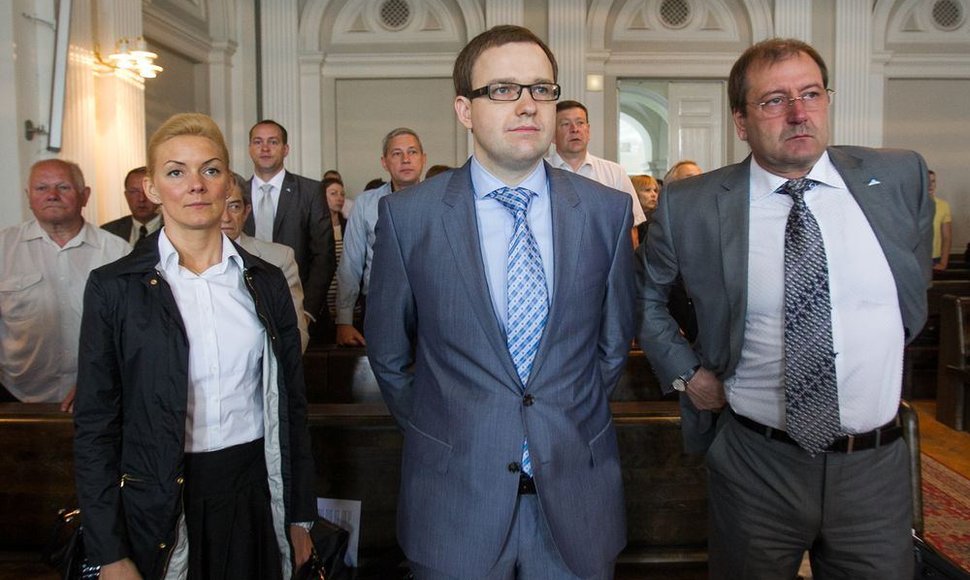Uspaskich, who fled to Russia in 2006, when the criminal investigation started, and had to be stripped of parliamentarian's legal immunity twice – once in the European Parliament and once in the Lithuanian Seimas – in order to be prosecuted, keeps insisting the case is fabricated by his political foes and the ruling has been passed by corrupt judges (his public statements to that effect might land him in courtroom once more, for slander). One-time minister of economy and founder of Lithuania's third-biggest parliamentary party (which is part of the current ruling coalition), Uspaskich has pledged to appeal against the ruling and it is still unclear if he will serve any of the 4-year jail sentence he was given.
Meanwhile his party fellow Gapšys, who was found by the court to have been less involved in the scheme and got away with a fine, serves as a vice-speaker of parliament, but is now facing a vote of no confidence initiated by the opposition.
Edmundas Jakilaitis, host of “Focus of Attention”, a political talk show on the LRT TV channel, spoke to Uspaskich about the case, the ruling, and his intentions of serving time, should the Court of Appeals affirm the guilty sentence.
– As soon as next week, the Seimas (parliament) may vote on declaring no confidence in your pupil Vytautas Gapšys. If the motion of removing him from the post of vice-speaker of parliament were supported by the majority of MPs, would that mean that the Labour Party must leave the ruling coalition?
 |
| Aurimo Šrubėno nuotr./Viktoras Uspaskichas |
– I cannot answer this question, it is up to the (party) council to decide.
– But what do you think? Say, will the social democrats side with the opposition and vote to remove Gapšys?
– I can say what moods prevailed in the party council. Some said we could not let this pass, there were even talks of leaving the coalition. But I believe we should look for other solutions, because nudging a person only for moral motifs, while this is clearly a political case and a crackdown, is something to be very cautious about. My advice to the social democrats is not to swallow the bait thrown to them by the opposition.
– Gapšys, who is also the new leader of your party, raised some eyebrows when he declared that he could and wanted to be speaker of parliament. Are you in on this?
– He did not say he wanted, he said he could. And indeed he can. His competence is sufficient for him to be speaker of parliament and lead very nicely. He will be a star speaker throughout the European Union.
– This is for real, not a bluff?
 |
| Aurimo Šrubėno nuotr./Vytautas Gapšys |
– The party has not considered this issue.
– Do you personally support [fellow Labour Party MP] Vydas Gedvilas as Parliament Speaker?
– Gedvilas is coping with his duties well, but it is Gapšys who has become the party leader. And, according to the Coalition Agreement, the post of Seimas speaker belongs to our party, so it is natural that it should go to the party leader.
– So your party is going to propose Gapšys as Seimas speaker?
– So far, we haven't brought this issue up.
– What's happening then? Is this a smokescreen?
– I personally would be happy to see Gapšys as Seimas speaker, but I repeat once more, there have been no discussions to that effect.
– Let's talk about you. You have been sentenced to four years in prison, you appealed against the ruling, but so did the Prosecutor's Office – they want to see you convicted on one additional count, fraud seeking to get state support. So it is possible that you might be sentenced for a longer term. If that happens, will you flee the country?
– I have nowhere to flee. The Earth is round, wherever you run, you end up in the same spot. But I will defend myself in all courts, all the way to the European Court.
– So you will appear in the courtroom of the Court of Appeals, despite the possibility that you might get arrested right there and put in jail?
– I hope that judges at the Court of Appeals are more competent, honest, that they won't commit a crime against justice, something that the judges at the court of first instance did.
– Judges of Vilnius District Court found you guilty on three counts and acquitted on only one charge. Do you think it is likely that the Court of Appeals will acquit you on all counts?
– Yes. They [prosecutors] can put down as many as 20 charges, I don't care. But no need to bluff. They need to do truthful investigations, do financial inspections. But that was not done.
 |
| Vitalija Vonžutaitė |
– But there are testimonies from witnesses. I have read the court ruling myself. But how could it happen that a young girl, Vitalija Vonžutaitė, who was only 25 at the time, could have earned so much of your trust [to be included as partner-in-crime]?
– You say there are witnesses. But I can tell you that there is not one who would say that Uspaskich gave orders to doctor accounting books, or that Uspaskich gave money.
– But there are witnesses who claim they went to see you in order to show you the “black” books. You familiarized yourself with the accounts, there was such a meeting. One witness claims that she was giving money from “black” coffers to various people who were pointed out to her by Vonžutaitė. You would not give such instructions yourself, but whenever there was a shortage of money in these accounts, there was a note saying “VU” (initials of Viktor Uspaskich) – meaning, presumably, that the money was given to you.
– Vonžutaitė did not confirm this testimony.
– Naturally, she would have incriminated herself if she had.
– That's immaterial. Evidence must be backed by documents or something more.
– But there are testimonies. There is the accountant who managed the “black” books and who cooperated with the prosecution. But let's return to Vonžutaitė – how could you have relied so heavily on a young girl like she was?
– I repeat once again, there is not a single testimony against me, nothing about Uspaskich taking or giving money.
– There are testimonies. There is an accountant who worked for a company called “Kartonas” (“Cardboard”), which is owned by “Vikonda” (concern owned by Uspaskich). She claims that Vonžutaitė used to tell her about the party leader taking sums of money from the “black” coffers. The doctored accounting was even done on a computer, as if it were genuine. Everything was done very scrupulously.
– Someone said that one gave something, the other didn't... Can this be reliable data? In a normal state with the rule of law, such testimonies would not be valid. This court ruling is criminal.
– That is your opinion. And still, from whence so much reliance on Vonžutaitė?
– I relied on Gapšys back when he was 20. A member in Vilnius Council is one called Kučinskaitė who must be the youngest [municipal council member] in Europe and the world. How come I trusted them? They are bright youths who need to be trusted.
– And you entrusted to her the responsibility for dozens of millions of litas in the “black” books? Because there were only two string pullers: Vonžutaitė and Uspaskich.
– Vonžutaitė was the head of the party headquarters. Meanwhile accounting is done by accountants.
– But Vonžutaitė was giving instructions.
– That is something they want to convince you of. But that is not true.
– Don't you feel any guilt for possibly destroying lives of these young people? Vonžutaitė is likely to go to jail, while the fate of Gapšys is still uncertain, because prosecutors have appealed against the court ruling and want him to serve time.
– I do [feel guilt]. And I have said that in the Seimas and in the courtroom.
– What did you say to them personally?
– The same. That they were used as pawns in this conspiracy-laden case in order to ruin me.
– Mister Uspaskich, the case contains explicit documentation, complete with tables of revenue and spending. Let me quote a passage from the ruling: “Because the party did not reveal its true sponsors and backers, in many cases revenues are coded not just in letters, detached names or other words, but also in company names that correspond to companies that received support from EU structural funds during that period: 'Paliūtis', 'Sanitas', 'Pamario Medis', 'Sebra', 'Senovė'. The court draws this conclusion from a testimony given by witness Jaruševičius, who told the court about how, during the Labour Party's council meeting dated January 2005, leader of the Labour Party Viktor Uspaskich had said: why should one let others make money, if one can make money oneself. Then he introduced Romas Ruškutis as someone who would be in charge of a consultancy firm that would advise entrepreneurs on how to apply for EU funding and draft projects; the money made by the firm would be used to support the Labour Party. Ruškulis gave his mobile phone number and they [Labour Party council members] had to pass it on to entrepreneurs seeking EU support.” What can you say about that?
– Sure, there were about 100 agencies like that in Lithuania. And thank goodness that there exist such agencies. But how they deal with entrepreneurs – that's their business.
– And what are we to make of this? Five percent of the future EU grant is paid to the party's “black” account – and then the company that pays it gets the grant. That's something evident from sheets in the “black” books. How do you explain that?
– You want to tie some random agency to the Labour Party. No, dear sirs, that won't work. That accountant worked for Ruškulis. She serviced five companies.
– But she worked for “Vikonda” and did “black” books of your party.
– She did books for five different companies. They were presented by Ruškulis himself. What's the problem here? What does the Labour Party have to do with it? Will you now assign the entire turnover of “Vikonda” to the Labour Party? Take any agency you like and tie it to the Labour Party.
– Most agencies, though, will probably not have revenue lines with initials “VU”, won't have Gapšys and Vonžutaitė, won't have payments for performances at party conventions, etc. Your “black” books worked like a very profitable company, you made more money than you spent.
– When the Prosecutor's Office and its agents, who were employed at the Labour Party's bookkeeping, were doctoring this entire case, they couldn't even do the conversions right. 10 thousand dollars is valued at 230 thousand litas; 40 thousand dollars becomes half a million litas. And all this included into calculations of our fine. Therefore read the ruling closely.
– Mister Uspaskich, you have filed an appeal, you will be able to present your arguments again, if anyone will listen to them.
– This case should not graze on the political level, let it be over and let politicians examine how court proceedings are conducted.
– This was a legitimate ruling adopted by a college of judges.
– A college that received a promotion after this ruling. Because before the ruling, they were invited to the President's Palace and asked – do you want to be someone? If you do, then act.
– How do you know that?
– Last Wednesday or Thursday, judge Kazlauskienė from that college was appointed chairwoman of the department.
– I do not know if a court ruling can be an example of political crackdown, but if we could publish it as a book or even translate into English, it would make for an excellent textbook on political corruption. Complete with charts illustrating how, using your own term, to get “otkaty” (share of illegal proceeds) in exchange for EU grants, how to doctor accounting books. Everything was conducted in cash.
– Please, make a distinction between books of the Labour Party and some random agency.
– Instead of the party's “black” bookkeeping, should I speak of politician Uspaskich's “black” bookkeeping?
– You can speak whatever you like, but what you say is a lie.
– Are you sincere when you say that you will be in the courtroom to hear the ruling from the Court of Appeals and risk being arrested right there and then?
– Why should I risk anything, if I am innocent?












